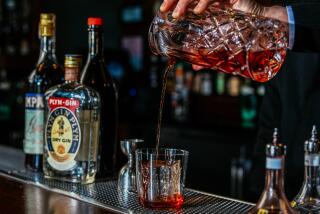Britons Put an End to Absence of Absinthe
- Share via
LONDON — Toulouse-Lautrec drank it from a hollowed walking stick. Degas immortalized it in his bleary-eyed painting, “Absinthe Drinker.” And Van Gogh nursed a disturbed mind on the aquamarine liquor, which may have encouraged him to amputate his ear.
The “green fairy” to some, the devil’s potion to others, absinthe was the drink of choice for a generation of bohemian artists and writers in fin-de-siecle Paris until it was banned by the French government in 1915.
Now absinthe is back, this time in end-of-millennium London.
Four entrepreneurs who call themselves Green Bohemia began importing Hill’s Absinth from the Czech Republic two months ago, peddling it primarily to the upscale, artsy crowd of London’s Soho district but also offering the elixir for sale in Britain on the Internet.
“A lot of people have gone for it,” said Tom Hodgkinson, one of those responsible for the absinthe revival after its decades-long absence here. “It is literary and hedonistic at the same time. It appeals to serious drinkers, thinkers and artists.”
Oscar Wilde, living in France after his fall from grace in England, was among those who succumbed to its charms before his death in 1900.
“Absinthe has a wonderful color, green. A glass of absinthe is as poetical as anything in the world,” he wrote. “What difference is there between a glass of absinthe and a sunset?”
The side effects, for one. Absinthe is about 70% alcohol and packs twice the wallop of a shot of vodka. It is made from the wormwood plant, which is reputed to have a hallucinogenic effect, and flavored with a blend of anise, angelica root and other aromatics.
“I haven’t heard of anyone hallucinating, but I have seen a few people walk into mirrors,” said Paul Hutchison, head bartender at the Groucho Club here. “Like with any alcohol, people quite often lose part of the evening.”
Absinthe was first produced for sale in 1797 by Henri-Louis Pernod, who reportedly bought the recipe from a compatriot living in Switzerland. For more than a century, absinthe flowed in French cafes and cabarets like “the green waters of summer,” as the poet Baudelaire described it.
Bewitching color aside, artists in 19th century Paris drank absinthe because they could afford it. Absinthe offered a cheap, ethereal drunk until it was outlawed amid what Hodgkinson called “a moral panic about its effects on the working classes.”
In Britain, absinthe did not catch on to the same degree and was never banned, as it was in the United States and many other nations. Today, however, the British working classes likely are not at great risk, with Hill’s Absinth selling for $68 a bottle.
Alcohol Concern, a national agency on alcohol abuse, does not foresee an absinthe epidemic but warns against abuse.
“This is an extremely powerful drink, and people will want to be very wary about using it,” said Lee Lixenberg, a spokesman for Alcohol Concern. “Bearing in mind that we don’t imagine hordes queuing up to buy this drink, what concerns us most is it is available on the Internet.”
Green Bohemia, newcomers to the booze business, wanted to start small and trendy, taking their cues from the marketing success of Absolut Vodka.
Only one of the four partners had any experience with imports. However, the quartet had friends in the right places--bars such as the private Groucho Club, where absinthe was introduced into the media, publishing and theater crowd.
They presented absinthe as “the spirit of freedom,” a kind of rebellion against the clean-cut “New Labor” values of Britain’s ruling party.
“We despise the bungee-jumping men’s health culture that prevails, the world of the Pepsi Max generation, who consider that any activity--no matter how mindless--is better than sitting around doing nothing,” Hodgkinson wrote in the Daily Telegraph at the time. “Absinthe, we think, encourages conversation, independent thought and creativity.”
The quartet’s approach worked. Absinthe attracted media coverage and quick converts, including a film critic who frequents the Groucho Club.
“What do I think of it? I don’t think too much because I don’t remember. I love it,” he said, laughing.
Perhaps what he meant was, absinthe makes the heart grow fonder.
More to Read
Sign up for The Wild
We’ll help you find the best places to hike, bike and run, as well as the perfect silent spots for meditation and yoga.
You may occasionally receive promotional content from the Los Angeles Times.




